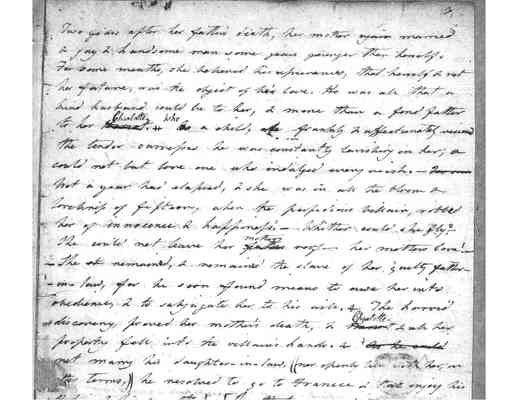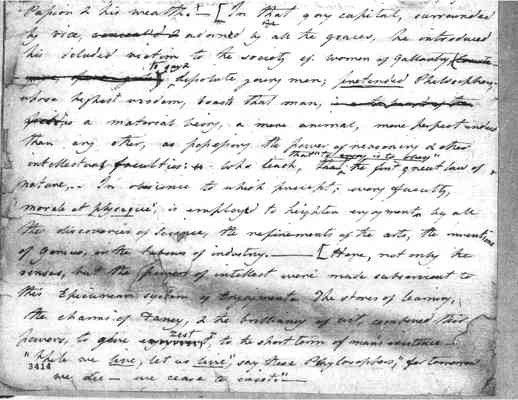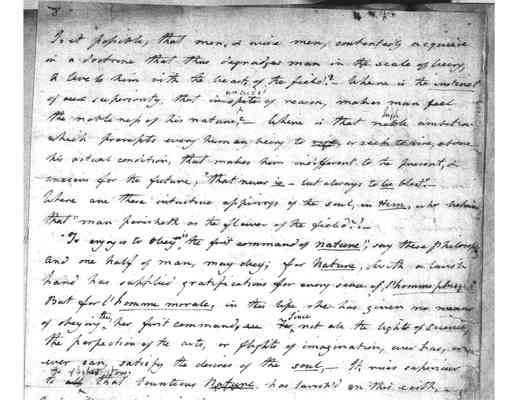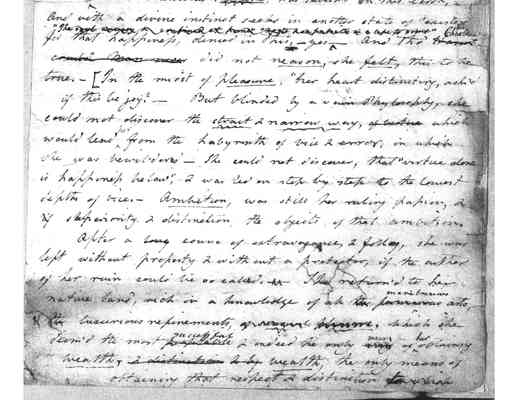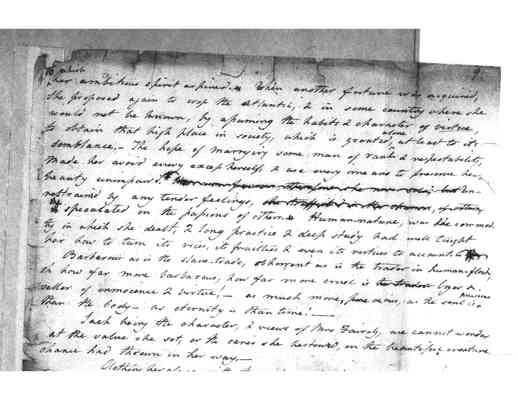Pages
16
Two years after her father's death, her mother again married a gay and handsome man some years younger than herself. For some months, she believed his assurances, that herself and not her fortune, was the object of his love. He was all that a kind husband could be to her, and more than a fond father to her Charlotte.Who as a child, frankly and affectionately received the tender carresses he was constantly lavishing on her; and could not but love one who indulged every wish. Not a year had elapsed, and she was in all the bloom and loveliness of fifteen, when the perfidious villain, robbed her of innocence and happiness! Whither could she fly? She could not leave her mother's roof--her mother's love! She remained, and remained the slave of her guilty fatherin-law, for he soon found means to { ?} her into obedience, and to subjugate her to his will. The horrid discovery, proved her mother's death, and Charlotte and all her property fell into the villain's hands. As he could not marry his daughter-in-law, (nor openly live with her, on either terms) he resolved to go to France and there enjoy his
17
passions and his wealth. [In that gay capital, surrounded by vice, adorned by all the graces, he introduced his deluded victim to the society of women of gallantry to gay and dissolute young men; pretended philosophers, whose highest wisdom, boasts that man, a material being, a mere animal, more perfect indeed than any other, as possessing the power of reasoning and other intellectual faculties: who teach, that" to enjoy is to obey" the first great law of nature. In obedience to which precept, every faculty, morals at physique, is employed to heighten enjoyments by all the discoveries of Science, the refinements of the arts, the inventions of Genius, or the labours of industry. [Here, not only the senses, but the power of intellect were made subserviant to this Epicurean system of Enjoyment. The stores of learning, the charms of Fancy, and the brilliancy of wit, combined their powers, to give zest, to the short term of man's existence-"While we live, let us live,: say these Phylosophers, "for tomorrow we die--we cease to exist."
18
Is it possible, that men, and wise men, contentedly acquiesce in a doctrine that thus degrades man in the scale of being, and live to him with the beasts of the field? Where is the instinct of superiority, that unaided spots of reason, makes man feel the nobleness of his nature? Where is that high ambition which prompts every human being to rise, or seek to rise, above his actual condition, that makes him indiffent to the present, and anxious for the future, that never is--but always to be blest". Where are these intuitive aspirings of the soul, in them, who believe that man perisheth as the flower of the field?! "To enjoy is to obey is the first command of nature," say these philolophers, and one half of man, may obey; for Nature, with a lavish hand has supplied gratifications for every sence of l'homme physique. But for l'homme morale, in this life she has given no means of obeying this, her first command. Since not all the lights of science, the perfection of the arts, or flights of imagination, ever has, or ever can, satisfy the desires of the soul, It, rises superiour to the richest stores that bounteous Nature, has lavished on this earth.
19
and with a divine instinct seeks in another state of { ?}, for that happiness, denied in this,--yes--and tho' Charlotte did not reason, she felt, this to be true. [In the midst of pleasure, "her heart distrusting, ask'd if this be joy? But blinded by a vain Phylosophy, she could not discover the strait and narrow way, of virtue which would lead her from the labyrinth of vice and error, in which she was bewildered--She could not discover, that "virtue alone is happiness below", and was led on step by step to the lowest depths of vice. Ambition, was still her ruling passion, and superiority and distinction, the objects of that ambition. After a long course of extravagance, and folly, she was left without property and without a protector, if the author of her ruin could be so called. She returned to her native land, rich in a knowledge of all the meretricious arts, the luxurious refinements, which she deem'd the most successful and indeed the only means of her obtaining wealth, and by wealth, the only means of obtaining that respect and distinction
20
to which her ambitious spirit aspired. When another fortune was acquired, she proposed again to cross the Atlantic, and in some country where she would not be known, by assuming the habits and character of virtue, to obtain that high place in society, which is granted, alone at least to its semblance. The hope of marrying some man of rank and respectability, made her avoid every excess herself, and use every means to preserve her beauty unimpour'd. unstrained by any tender feelings, she speculated on the passions of others. Human-nature, was the commodity in which she dealt, and long practice and deep study had well taught her how to turn its vices, its frailties and even its virtues to account. Barbarous as is the slave-trade, abhorrent as is the trader in human-flesh, oh how far more barbarous, how far more cruel is buyer and seller of innocence and virtue! as much more, as the soul is precious than the body--as eternity is than time! Such being the character, and views of Mrs Fairely, we cannot wonder at the value she set, or the cares she bestowed, on the beautiful creature chance had thrown in her way.
